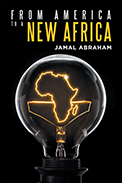
 |
Jamal Abraham, an electrical and manufacturing engineer, examines "the statehood status of Black Americans in post-Obama America." The detailed narrative offers a theoretical strategy for upgrading underdeveloped African countries with industrial projects headed by Black Americans in exchange for land. He suggests that Egypt, Tanzania, Morocco, Ivory Coast, and Angola are suitable nations, "selected after being scrutinized on the merits of geography, natural resources, civil war status, type of government, political motivations and ideology on education."
Abraham calls his proposed initiative the International AA Workforce (IAAW) and its major task the Nation Building Project. The narrative inspires a question. Would any of the suggested nations consent to exchange land for the labor of African Americans involved in nation-building through various vocational and industrial projects? Abraham suggests that this point would be negotiated with the countries involved and that they would appreciate having a workforce "that looks like them." He adds that "we would not be coming there with hidden agendas of stealing and robbing from them," pointing out the trespasses of European colonial powers of the past and the hyper-capitalist powers of the present (China, EU) who extract wealth from African nations with minimum benefit to citizens.
The author clearly shows how IAAW is different than other international organizations working in Africa, such as UNIDO, an industrial development division of the United Nations, and other groups such as the U.S. Peace Corps and WHO. While the writing is sometimes a bit uneven and repetitive, this nation-building project's particulars are thoroughly explained. Abraham specifies in detail the many ways IAAW could potentially benefit each of the examined countries. Overall, the visionary plan seems well-rounded and plausible. Additionally, Abraham's frame of reference has a Christian philosophical foundation, lending an inspirational touch to his pan-African viewpoint.